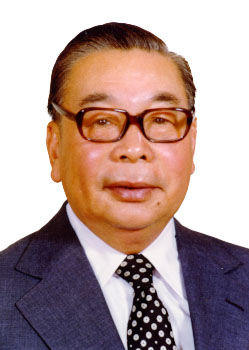Chiang Ching-kuo
 Chiang Ching-kuo [CCK / Jiang Jing-guo] became the president of Taiwan in 1978, breaking the unreachable leadership image, often visiting the towns and towns with ease and facilitating "political innovation" in the later period. Jiang Jing-guo had two sentences: "I am an authoritarian, but I am the last one. I will end the autocracy with autocracy". He did it. From the late 1970s, Chiang Ching-kuo adopted political reforms that enhanced democractic development in Taiwan. He also started to decrease the tension between Taiwan and China.
Chiang Ching-kuo [CCK / Jiang Jing-guo] became the president of Taiwan in 1978, breaking the unreachable leadership image, often visiting the towns and towns with ease and facilitating "political innovation" in the later period. Jiang Jing-guo had two sentences: "I am an authoritarian, but I am the last one. I will end the autocracy with autocracy". He did it. From the late 1970s, Chiang Ching-kuo adopted political reforms that enhanced democractic development in Taiwan. He also started to decrease the tension between Taiwan and China.
The eldest son of Chiang Kai-shek, Nationalist China's venerable president, Chiang Ching-kuo was long the mystery man of Formosa who avoided the limelight. Partly, he had professional reasons: as chief of Formosa's secret police and head of the guerrilla activities directed against Red China, he naturally sought the shadows.
Ching-kuo was known as “Little Chiang". Born in Chekiang province to the Gimo's first wife, a peasant girl who was later killed in a Japanese bombing raid, Ching-kuo was 16 when the Gimo sent him to Moscow in 1925 "to learn more about revolutionary ideas." He joined the Komsomol and studied guerrilla tactics at a Red army academy. When Chiang Kai-shek broke with the Communists in 1927, a letter over Ching-kuo's name appeared in Pravda denouncing his father as a "traitor.” He said the letterwas a forgery. Ching-kuo himself broke with Stalin on the issue of Trotskyism and put in some years of hard work in gold mines and factories.
When the Japanese threat forged a new bond between Stalin and the Gimo in 1937, Ching-kuo was permitted to leave for China with his shy, appealing Russian wife Fanina and their son Alan. Overjoyed at his son's return, the Gimo nevertheless thought him too Russian in his outlook and had him tutored for two years to "make him Chinese again." Ever since, Ching-kuo loyally and efficiently handled a succession of jobs for his father.
With no formal university education, Ching-kuo commanded little loyalty among Nationalist China's intellectuals, and his nonconformist methods irritated the top politicians of the Kuomintang. As s minister without portfolio in the Cabinet and special adviser to the President, Ching-kuo worked closely with his father. Another source of strength was Ching-kuo's 100,000-man Youth Corps, and his veto power over promotions army gave him enormous influence with junior officers. He liked hiking in the smountains, but since suffering from mild diabetes in the early 1960s had to forgo convivial drinking, mostly vodka.
Since 1978 when CCK took over the presidency from Yen Chia-kan, who succeeded President Chiang Kai-shek in 1975 and completed Gimo's fifth term as President of the ROC in 1978, CCK has become Taiwan's undisputed leader in name as well as in reality, and wielded virtually absolute power, much like his father before. Although CCK's rise to supreme power was assisted by his father and facilitated greatly by the death of General Chen Cheng in 1965, who was the number two man in the leadership hierarchy and the top contender to Gimo's mantle, he made it to the top largely through his own endeavor and the power he possesses had been largely won by himself. He did it step by step for almost three decades by securing control over each and every major " institution, building a broad base of power and breaking up or neutralizing other rival forces inside and outside the KMT.
He allowed the opposition to form the DPP. Less than two years before his death in 1988, he sat in a wheelchair and ended the 38-year martial law, lifting the party ban and signing a ban, and promoting democracy in Taiwan. When President Chiang Ching-kuo died in 1988, he was succeeded by Vice President Lee Teng-hui, who had been elected along with Chiang by the National Assembly to a 6-year term. Until 1986, Taiwan's political system was effectively one party. Before elections in 1986, many "nonpartisans" grouped together to form Taiwan's 1st new political party in over 4 decades -- the Democratic Progressive Party.
Friction between mainlanders and native Taiwanese continued to be a problem, but it abated with time and the gradual melding of the two Chinese communities. President Chiang Ching-kuo strengthened prospects for an orderly succession and support for his reformist policies, particularly by selecting Li Teng-hui, an ethnic Taiwanese, for the vice presidency at the ruling Kuomintang's 1984 plenum. In May 1984, Chiang Ching-kuo (CCK), at the age of 74, began his second six-year term as President of the republic of China (ROC). He had selected Dr. Lee Teng-hui, Governor of Taiwan Province, a native of Taiwan and 13 years his junior, to be the vice-President, in place of Shieh Tung-min, who stepped down due to advanced age (76).
Taiwan experienced a long political struggle during the authoritarian era. Democracy in Taiwan only began after the death of President Chiang Ching-kuo in January 1988 and the accession of Lee Teng-hui to the presidency. When the opposing party, the Democratic Progressive Party, won the presidential election in 2000, the one-party rule history ended and the two-party system was established.
|
NEWSLETTER
|
| Join the GlobalSecurity.org mailing list |
|
|
|

